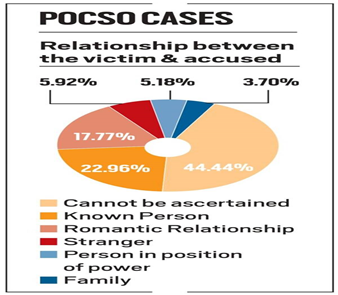14% Conviction in POCSO; In a Fourth of Cases, Accused Known to Victims, Says Study
26-08-2023
12:23 PM
1 min read

What’s in today’s article?
- About POCSO Act
- News Summary
Why In News?
- According to a think-tank examination of cases in e-Courts across the country under the Protection of Children from Sexual Offenses (POCSO) Act of 2012, 43.44% of trials result in acquittals and only 14.03% result in convictions.
- Furthermore, the accused were known to the victims in 22.9%, which is about fourth of the 138 judgments examined in detail.

The Protection of Children from Sexual Offences (POCSO) Act:
- About:
- It is the first comprehensive law in the country dealing specifically with sexual abuse of children, enacted in 2012 and is administered by the Ministry of Women and Child Development.
- It was intended to protect children from sexual assault, sexual harassment and pornographic violations, as well as to establish Special Courts for such trials.
- In 2019, the Act was amended to strengthen the penalties for specified offences in order to deter abusers and promote a dignified upbringing.
- Key provisions:
- Gender-neutral legislation: The Act defines a child as "any person" under the age of 18.
- Non-reporting is a crime: Any person in charge of an institution (excluding children) who fails to report the commission of a sexual offense involving a subordinate faces punishment.
- No time limit for reporting abuse: A victim may report an offence at any time, even years after the abuse has occurred.
- Keeping victim’s identity confidential: The Act forbids the disclosure of the victim's identity in any form of media unless authorised by the special courts established by the Act.
- Concerns:
- Such abuse is on the rise: Particularly since the Covid-19 outbreak, when new forms of cybercrime have emerged.
- Lack of awareness or knowledge: On the part of minor girls, boys, parents and society as a whole.
News Summary:
- Findings of the analysis:
- The analysis, titled "A Decade of Pocso," was conducted by the Justice, Access, and Lowering Delays in India (JALDI) Initiative at Vidhi Centre for Legal Policy in partnership with the World Bank's Data Evidence for Justice Reform (DE JURE) initiative.
- In addition, according to data provided by the National Crime Record Bureau (NCRB) in 2021, the accused in 96% of POCSO cases was a person known to the victim.
- Acquittals were 7 times more common in Andhra Pradesh than convictions, and 5 times more common in West Bengal.
- In Kerala, however, the difference between acquittal and conviction is not as large.
- In 2018, Delhi had the highest number of POCSO trials, with 13.54 cases per 100,000 people.
- UP has the biggest number of cases pending, accounting for more than three-fourths (77.77%) of all lawsuits filed between November 2012 and February 2021.
- One of the key causes for the high level of pending cases is the police's slow pace of investigation and the delay in depositing samples with the Forensic Science Laboratories.
- Way ahead:
- Educating children about the legislation and its provisions.
- Training and sensitisation programs.
- Implementation of the Fast Track Special Court’s Scheme.
- A child protection policy based on the principle of zero tolerance for child abuse.

